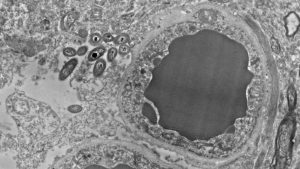Kelly Servick in Science:

We know the menagerie of microbes in the gut has powerful effects on our health. Could some of these same bacteria be making a home in our brains? A poster presented here this week at the annual meeting of the Society for Neuroscience drew attention with high-resolution microscope images of bacteria apparently penetrating and inhabiting the cells of healthy human brains. The work is preliminary, and its authors are careful to note that their tissue samples, collected from cadavers, could have been contaminated. But to many passersby in the exhibit hall, the possibility that bacteria could directly influence processes in the brain—including, perhaps, the course of neurological disease—was exhilarating. “This is the hit of the week,” said neuroscientist Ronald McGregor of the University of California, Los Angeles, who was not involved in the work. “It’s like a whole new molecular factory [in the brain] with its own needs. … This is mind-blowing.”
The brain is a protected environment, partially walled off from the contents of the bloodstream by a network of cells that surround its blood vessels. Bacteria and viruses that manage to penetrate this blood-brain barrier can cause life-threatening inflammation. Some research has suggested distant microbes—those living in our gut—might affect mood and behavior and even the risk of neurological disease, but by indirect means. For example, a disruption in the balance of gut microbiomes could increase the production of a rogue protein that may cause Parkinson’s disease if it travels up the nerve connecting the gut to the brain. Talking hoarsely above the din of the exhibit hall on Tuesday evening, neuroanatomist Rosalinda Roberts of The University of Alabama in Birmingham (UAB), told attendees about a tentative finding that, if true, suggests an unexpectedly intimate relationship between microbes and the brain.
More here.
